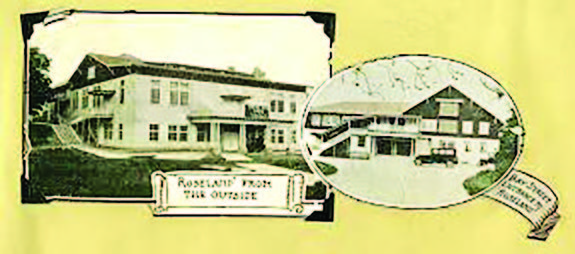A street, a venue, apartment houses: The story behind their names
In the years of my youth, I often wondered why streets had the names they did. Of course, I knew that famous people and historic events were memorialized in that way, but not all street names followed this pattern.
When we moved to Providence, we lived on Reynolds Avenue. I wondered: Who was Reynolds? Certainly not Barney Reynolds, the mayor. The street was there long before his election to office.
Were there actually pottery shops on Potters Avenue?
Why change Conanicus Street to Fifth but not Overhill Road to Seventh?
And for whom was Golemba Lane, in South Providence, named?
Archival materials at the Rhode Island Jewish Historical Association offer a possible answer to that last question. They indicate that one person with that last name (and his family) lived in Providence – indeed in all of Rhode Island – in the early 20th century, when the street name first appeared.
The year 1893 was an important milestone in the life of Morris Golemba. According to the naturalization records of the U.S. District Court for Rhode Island, compiled by David Adelman, he arrived in 1888 and became a citizen in 1893.
Morris Golemba and his wife Fanny (Gordon, who arrived around 1891), had two daughters, Sadie and Betty, and a son, Frank (who would become a lawyer, was active in the Republican Party and served a term as Cranston city solicitor). The family resided at 205 Willard Ave., in Providence, according to the 1895 City Directory.
Sources reveal that Golemba changed occupations several times over the years, from jeweler to grocer to owner of a dental lab in downtown Providence, with at least one other business venture in between. However, in the memoirs of his contemporaries, he is remembered as the proprietor of Golemba’s grocery store (c. 1896-1906), where their families shopped for food and where one young man got his first job.
Over the years, the Golemba family moved from Willard Avenue to Bogman Street and then to Hamilton Street. Any indication that they lived or he did business on Golemba Lane has eluded me.
Golemba was active in his community. Recorded in the Rhode Island Jewish Historical Association’s Notes (Vol. 1, #2) are three official documents that mention him: in a charter issued on April 12, 1896, for an organization named The Workingmen’s Money Saving Association of Providence, R.I.; in a charter issued on Aug. 22, 1898, for the South Providence Thrift Association; and in a charter issued on Feb. 3, 1899, for the South Providence Enterprising Association. Morris Golemba was listed as a founding member for all three organizations. Their purpose was to encourage each other in business and to assist sick members. Additionally, the first two groups assisted the widows and orphans of deceased members.
Was Golemba perhaps honored with a street name for his community activism? We may never know.
Over time, Golemba Lane disappeared into the many redevelopment projects in South Providence.
In a recent email, a Jewish Rhode Island reader, Steve Kane, closed by asking if I was aware that Roseland, in Taunton, Massachusetts, was named for his great-aunt Rose Kaplan. I was not, but I knew of the Roseland ballroom, although I was too young to be admitted.
Of Rose Kaplan’s life, very little is known. While a young child, she and her family emigrated from Russia to Boston. School did not interest her, but music did. After eighth grade, she found work in a garment factory. She saved her money, and, in 1926, bought a large barn in Taunton for $2,000 at an auction. She decorated it in rustic fashion and turned it into a very successful venue for barn dances.
Once again, Kaplan saved her money. Very soon, she was able to tear down the barn and replace it with the three-story building she named Roseland.
In its day, Roseland was the epitome of glitzy elegance. The glamorous décor included a revolving crystal ball, centered high above the huge dance floor, mirrored walls, chandeliers, padded booths and potted palms.
For almost 20 years, though the Great Depression, Prohibition, World War II and gas rationing, Roseland was the destination for people from all parts of New England who enjoyed jazz, swing and dancing to the music of the big bands. Harry James, Benny Goodman, the Dorseys, Glenn Miller, Paul Whiteman, to name just a few, all appeared there. Also drawing large crowds were the dance contests featuring professional dancers.
Steve Kane’s father said that on Saturday nights, the dance floor was so crowded, you could not put your hand in your pocket.
Roseland was Rose Kaplan’s American Dream come true. But in 1947, a fire destroyed the venue. Fortunately, no one except Rose was there, and she escaped.
She rebuilt the building, but not the appeal. The heyday of ballrooms, swing and big bands was fading away, replaced by rock ’n’ roll and other music genres. The new music and Roseland were not compatible.
After the death of her husband, Rose Kaplan went into seclusion in the penthouse atop Roseland. She died in 1990. The building was auctioned in 1992 to pay debts.
My late friend and colleague Eleanor Horvitz told me this final story. A row of smallish apartment houses, built in the 1940s, line a block on Thackery Street in Providence. The builder, Lawrence Paolino, wanted to honor his wife, Gertrude, by naming them for her, using her Yiddish name, Gittel. But her daughter, Esther (Mrs. Louis Chester), thought the name lacked élan and was not fancy enough, so a French touch was given to Gittel, and the Gettelle Apartments came into being.
GERALDINE S. FOSTER is a past president of the R.I. Jewish Historical Association. To comment about this or any RIJHA article, contact the RIJHA office at info@rijha.org or 401-331-1360.








